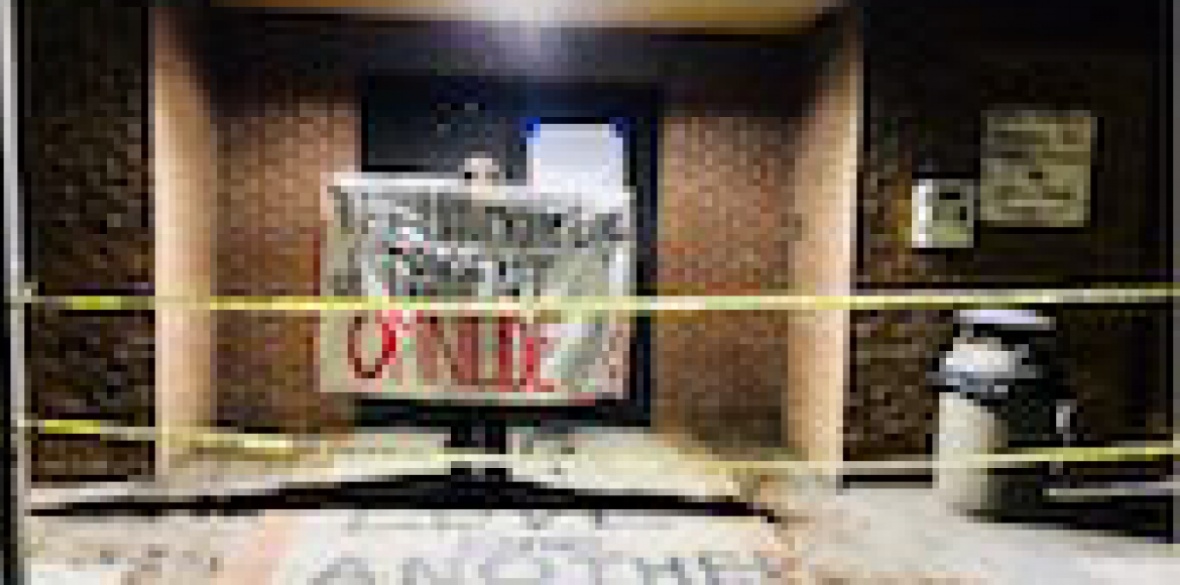This is the last article you can read this month
You can read more article this month
You can read more articles this month
Sorry your limit is up for this month
Reset on:
Please help support the Morning Star by subscribing here
SEVEN peace activists who entered a US Trident submarine base in Georgia 18 months ago to protest against nuclear weapons were convicted on Thursday.
The jury in the federal criminal trial took just under two-and-a-half hours to find the all of the defendants guilty on every count.
Mark Colville, Clare Grady, Martha Hennessy, Steven Kelly, Liz McAlister, Patrick O’Neill and Carmen Trotta were each convicted of conspiracy, destruction of property at the Kings Bay naval base and depredation — meaning damage — of government property.
They were also found guilty of the lesser offence of trespass. The trial had lasted just four days.
Judge Lisa Godbey Wood said it would take her between 60 and 90 days to decide on their sentences.
All were released to their families except Father Kelly, a 70-year-old Catholic priest who has already spent more than 10 years of his life in jail for other protests. He remains incarcerated due to an earlier offence.
After serving a 15-month sentence for breaking into the Kitsap-Bangor naval base in Washington state in 2010, the west coast home of eight US Trident nuclear submarines, Fr Kelly violated probation almost a year after he was released.
The seven Catholic activists on trial in Georgia had entered the US naval base at Kings Bay on April 4 last year to draw attention to what they see as the crime of nuclear weapons. Kings Bay is the home port of six Trident nuclear submarines.
The activists chose the date because it marked 50 years since the assassination of US civil rights and peace activist Martin Luther King.
On the judge’s instructions, family members and friends in the packed courtroom remained silent as the verdicts were read out one by one. But once the judge had declared the proceedings closed, a chorus of singing echoed from the hallways into the courtroom, where others joined in a rendition of Rejoice in the Lord Always.
As the defendants left the courtroom, they passed through a line of well-wishers.
Frida Berrigan, Ms McAlister’s daughter, sobbed with her mother after the verdict.
She was 10 when her mother was jailed for the first time, after a similar protest action in 1983 at Griffiss air force base in Rome, New Jersey, where the protesters hammered on and poured blood over B-52 bombers carrying cruise missiles.
“It just gets harder,” said Ms Berrigan, the oldest of Ms McAlister’s three children, especially as her mother nears her 80th birthday next month.
Ms McAlister’s late husband Philip Berrigan, a former priest, was a founder of the Plowshares movement on which the Kings Bay action is based.
Ms McAlister, a former nun, married Mr Berrigan in 1969 while he was awaiting sentencing for pouring blood on draft files in the US Customs House in Baltimore at the height of the Vietnam war.
According to Frida, her parents “spent 11 years of their 27-year marriage separated by prison.”
Although the Kings Bay Plowshares 7, as they are known, could now face 25 years each in jail, Ms McAlister and Mr Colville stayed in prison for almost the entire 18 months between arrest and the trial. Fr Kelly has never left the jail.
Supporters expressed the hope that the three would be sentenced to time served. The other four were released on bond after seven weeks of incarceration and could receive longer prison sentences.
Outside the courthouse after the verdict, Ms Hennessy observed: “The weapons are still there. We are called to keep trying. We have no other choice.”
While awaiting the verdict, defence lawyer Bill Quigley, who represented Ms McAlister, said that the prosecution had offered the defendants a plea deal, asking if they would instead plead guilty to just two offences, one of them trespass.
But, Mr Quigley said, the defendants wanted the chance to appear in court and have a public discussion about the horror of nuclear weapons and why they went to the base to protest against them.
He said his only regret was that, due to restrictions ordered by the judge before the trial, they had been unable to talk more about the Trident missiles and their terrible destructive power.
But the prosecution told the jury to ignore the reasons the activists went to the base. Assistant US Attorney Greg Gilluly boiled down the case to a simple argument.
The defendants, he said, had committed a crime because they “chose to trespass, to do damage and destruction and to break things that didn’t belong to them.”
During Mr Quigley’s closing arguments, he emphasised that all seven defendants had acted out of their respect for the Rev King and that they came in peace.
But Mr Gilluly dismissed the defendants’ efforts to compare their actions to those of King and Rosa Parks.
“Rosa Parks did not bring a power saw to destroy someone’s property,” Mr Gilluly said, recalling how the black civil rights activist was arrested after refusing to move to the back of the bus on which she was travelling at a time when segregation was still the law.
Mr Gilluly put up slide after slide showing the destruction at the Kings Bay base, along with photos of the tools the activists had used.
“This was not a peaceful protest,” he reiterated after each example.
The defendants, Mr Gilluly said, “broke the federal law of the United States of America. We are a country of law and equal protection under the law. There is not an exception. That would result in chaos.”
The jury of nine women, including three African-Americans, and three white men evidently agreed.










